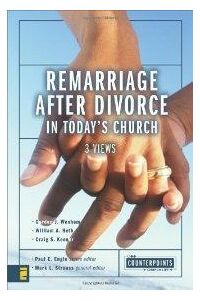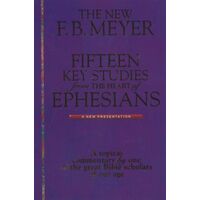Cart is empty
Remarriage after Divorce in Today's Church: 3 Views
ISBN: 9780310255536
RSP: $22.99
Our Price: $5.75
You Save: 75%
Availability: In Stock
Quantity available: 68
Remarriage after Divorce in Today's Church: 3 Views
Description
A biblical and practical case for three main evangelical views on remarriage after divorce Among born-again Christians, 27 percent have experienced divorce as compared to 24 percent in the general population. Yet no consensus exists among evangelicals on their views of remarriage, leaving many Christians confused. This single volume summarizes and explores three main evangelical views: no remarriage, remarriage after adultery or desertion, and remarriage for a variety of reasons. Each of the three contributors offers his point of view succinctly with biblical support, and each interacts with the others to help readers come to their own conclusions. Contributors include: Gordon J. Wenham * No remarriage after divorce William A. Heth * Remarriage (two grounds) Craig S. Keener * Remarriage (variety of reasons)Editorial ReviewsAbout the AuthorMark Strauss (PhD, Aberdeen) is professor of New Testament at Bethel Seminary in San Diego. He has written The Davidic Messiah in Luke-Acts, Distorting Scripture?, The Challenge of Bible Translation and Gender Accuracy, and Luke in the Zondervan Illustrated Bible Background Commentary series. Forthcoming books include The Gospels and Jesus, Mark in the revised Expositor's Bible Commentary series, and Mark in the Zondervan Exegetical Commentary series.Craig S. Keener (PhD, Duke University) is professor of biblical studies at Palmer Theological Seminary of Eastern University.Excerpt. Reprinted by permission. All rights reserved.Chapter One No Remarr iage after Divorc e 19 No Remarr iage after Divorc e Gordon J. Wenham The issue of remarriage after divorce painfully divides evangelical Christians. Perhaps you have seen tension over this issue in your own family or church or among your friends. I hope to shed light on what I believe Scripture teaches about this sensitive issue. My goal is that you will become biblically informed and feel better equipped to discuss the issue. But before I set out the reasons why I think divorced Christians should not remarry, I want to set out some points about marriage with which I believe my coauthors agree. Perhaps you will agree as well. Points of Agreement about Marriage First, the Bible advocates lifelong, monogamous heterosexual marriage as best for human welfare. Jesus points to two passages in Genesis as foundational for his view of marriage (Mark 10:6 -- 7; Matt. 19:4 -- 5). The first is Genesis 1:27 -- 28, which tells of God's creation of man and woman in his image. Their union is blessed by God as a means of perpetuating the human race for the benefit of creation. They are told to 'be fruitful and increase in number.' The second passage Jesus cites, Genesis 2:24, is even more explicit about biblical ideals for marriage. Adam's loneliness could not be satisfied by the creation of the animals or by the creation of other men, but by just one woman. Adam's joy at Eve's creation shows that monogamous heterosexual partnership offers the most satisfying sort of human relationship. It 20 | Remarriage after Divorce in Today's Church is noteworthy, too, that Eve is created out of Adam's rib. She is formed from him, which indicates the intimate bond between them --- and between every married couple. This is summed up in Jesus' quotation of Genesis 2:24 in Matthew 19:5: 'For this reason a man will leave his father and mother and be united to his wife, and the two will become one flesh.' The Hebrew term here translated 'be united,' which may also be rendered 'stick,' suggests a bond that cannot easily be broken. Indeed, the statement that they become 'one flesh' is a description of the relationship between close relatives (cf. Gen 29:14), which endures whatever changes occur to the related individuals. The second point of agreement with my colleagues is that marriage is an image of the relationship between God and Israel, and in the New Testament it's an image of Christ and the church. Traditionally, Song of Songs, which on the surface is all about human love, has been understood as an image of God and his bride, Israel, or the church. The prophets identify the infidelity of Israel as adultery against God (cf. Jeremiah, Ezekiel, Hosea). The apostle Paul is most explicit: 'Husbands, love your wives, just as Christ loved the church and gave himself up for her. . . . 'For this reason a man will leave his father and mother and be united to his wife, and the two will become one flesh.' This is a profound mystery --- but I am talking about Christ and the church' (Eph. 5:25, 31 -- 32). The third point of agreement is the understanding that divorce is a failure due to sin. As Jesus put it, 'Moses permitted you to divorce your wives because your hearts were hard. But it was not this way from the beginning' (Matt. 19:8). Though all of us are sinners, and this fact will have an obvious impact on the marriage relationship, to agree that divorce is caused by sin is not to say that, when it occurs, both parties are equally to blame. Some divorced people are more innocent than others. But when divorce occurs, it demonstrates a breakdown in relationships, which is at odds with the gospel message of forgiveness and reconciliation. God loves us even though we are sinners (Rom. 5:8), so his people should love each other despite the experience and reality of sin. The fourth point of agreement is the awareness that the present situation is catastrophic. The present anarchy in sexual No Remarriage after Divorce | 21 behavior is leading to family and social instability on an unparalleled scale. In Western societies, about half of marriages end in divorce. A large percentage of children are born out of wedlock. One in five pregnancies is aborted. Teenage homelessness is largely caused by conflict with stepfathers. Violence between partners is five times as common in cases where the couple cohabits rather than marries. Child abuse is thirty times more common in situations where single mothers have a series of boyfriends. The non-Western world is appalled as they look at the West and its destruction of family values.1 None of us would suggest that simply banning divorce and remarriage will cure the breakdown of family life. But I believe that the rejection of the traditional Christian approach to this issue is one part of the package of secularism that has led to our present situation. We cannot simply turn the clock back and restore primitive Christian practices in our broken society, but we do need to recapture the biblical understanding of marriage and press our churches and our politicians to change their approach to family issues, so that once again there are incentives for people to follow the Christian pathway. It is my contention that both the New Testament and the history of the church support the view that Christians should not remarry after divorce.2 Because this view is so little appreciated in American evangelical circles, I want to spend most of this chapter on giving you reasons why I believe it is the correct view. My Argument for No Remarriage after Divorce The argument proceeds in four stages (see chart on p. 22). First, I will examine the attitude of the early church. In the first three centuries of the Christian era, not a single writer supposes that the New Testament allows remarriage after divorce. Since these writers' mother tongue was Greek, they understood the language of the New Testament much better than any modern scholar. Furthermore, the very earliest writers may have known the apostles personally --- or at least their immediate successors --- so they would have been familiar with apostolic attitudes.
Attachments
Reviews
Reviews
Description
A biblical and practical case for three main evangelical views on remarriage after divorce Among born-again Christians, 27 percent have experienced divorce as compared to 24 percent in the general population. Yet no consensus exists among evangelicals on their views of remarriage, leaving many Christians confused. This single volume summarizes and explores three main evangelical views: no remarriage, remarriage after adultery or desertion, and remarriage for a variety of reasons. Each of the three contributors offers his point of view succinctly with biblical support, and each interacts with the others to help readers come to their own conclusions. Contributors include: Gordon J. Wenham * No remarriage after divorce William A. Heth * Remarriage (two grounds) Craig S. Keener * Remarriage (variety of reasons)Editorial ReviewsAbout the AuthorMark Strauss (PhD, Aberdeen) is professor of New Testament at Bethel Seminary in San Diego. He has written The Davidic Messiah in Luke-Acts, Distorting Scripture?, The Challenge of Bible Translation and Gender Accuracy, and Luke in the Zondervan Illustrated Bible Background Commentary series. Forthcoming books include The Gospels and Jesus, Mark in the revised Expositor's Bible Commentary series, and Mark in the Zondervan Exegetical Commentary series.Craig S. Keener (PhD, Duke University) is professor of biblical studies at Palmer Theological Seminary of Eastern University.Excerpt. Reprinted by permission. All rights reserved.Chapter One No Remarr iage after Divorc e 19 No Remarr iage after Divorc e Gordon J. Wenham The issue of remarriage after divorce painfully divides evangelical Christians. Perhaps you have seen tension over this issue in your own family or church or among your friends. I hope to shed light on what I believe Scripture teaches about this sensitive issue. My goal is that you will become biblically informed and feel better equipped to discuss the issue. But before I set out the reasons why I think divorced Christians should not remarry, I want to set out some points about marriage with which I believe my coauthors agree. Perhaps you will agree as well. Points of Agreement about Marriage First, the Bible advocates lifelong, monogamous heterosexual marriage as best for human welfare. Jesus points to two passages in Genesis as foundational for his view of marriage (Mark 10:6 -- 7; Matt. 19:4 -- 5). The first is Genesis 1:27 -- 28, which tells of God's creation of man and woman in his image. Their union is blessed by God as a means of perpetuating the human race for the benefit of creation. They are told to 'be fruitful and increase in number.' The second passage Jesus cites, Genesis 2:24, is even more explicit about biblical ideals for marriage. Adam's loneliness could not be satisfied by the creation of the animals or by the creation of other men, but by just one woman. Adam's joy at Eve's creation shows that monogamous heterosexual partnership offers the most satisfying sort of human relationship. It 20 | Remarriage after Divorce in Today's Church is noteworthy, too, that Eve is created out of Adam's rib. She is formed from him, which indicates the intimate bond between them --- and between every married couple. This is summed up in Jesus' quotation of Genesis 2:24 in Matthew 19:5: 'For this reason a man will leave his father and mother and be united to his wife, and the two will become one flesh.' The Hebrew term here translated 'be united,' which may also be rendered 'stick,' suggests a bond that cannot easily be broken. Indeed, the statement that they become 'one flesh' is a description of the relationship between close relatives (cf. Gen 29:14), which endures whatever changes occur to the related individuals. The second point of agreement with my colleagues is that marriage is an image of the relationship between God and Israel, and in the New Testament it's an image of Christ and the church. Traditionally, Song of Songs, which on the surface is all about human love, has been understood as an image of God and his bride, Israel, or the church. The prophets identify the infidelity of Israel as adultery against God (cf. Jeremiah, Ezekiel, Hosea). The apostle Paul is most explicit: 'Husbands, love your wives, just as Christ loved the church and gave himself up for her. . . . 'For this reason a man will leave his father and mother and be united to his wife, and the two will become one flesh.' This is a profound mystery --- but I am talking about Christ and the church' (Eph. 5:25, 31 -- 32). The third point of agreement is the understanding that divorce is a failure due to sin. As Jesus put it, 'Moses permitted you to divorce your wives because your hearts were hard. But it was not this way from the beginning' (Matt. 19:8). Though all of us are sinners, and this fact will have an obvious impact on the marriage relationship, to agree that divorce is caused by sin is not to say that, when it occurs, both parties are equally to blame. Some divorced people are more innocent than others. But when divorce occurs, it demonstrates a breakdown in relationships, which is at odds with the gospel message of forgiveness and reconciliation. God loves us even though we are sinners (Rom. 5:8), so his people should love each other despite the experience and reality of sin. The fourth point of agreement is the awareness that the present situation is catastrophic. The present anarchy in sexual No Remarriage after Divorce | 21 behavior is leading to family and social instability on an unparalleled scale. In Western societies, about half of marriages end in divorce. A large percentage of children are born out of wedlock. One in five pregnancies is aborted. Teenage homelessness is largely caused by conflict with stepfathers. Violence between partners is five times as common in cases where the couple cohabits rather than marries. Child abuse is thirty times more common in situations where single mothers have a series of boyfriends. The non-Western world is appalled as they look at the West and its destruction of family values.1 None of us would suggest that simply banning divorce and remarriage will cure the breakdown of family life. But I believe that the rejection of the traditional Christian approach to this issue is one part of the package of secularism that has led to our present situation. We cannot simply turn the clock back and restore primitive Christian practices in our broken society, but we do need to recapture the biblical understanding of marriage and press our churches and our politicians to change their approach to family issues, so that once again there are incentives for people to follow the Christian pathway. It is my contention that both the New Testament and the history of the church support the view that Christians should not remarry after divorce.2 Because this view is so little appreciated in American evangelical circles, I want to spend most of this chapter on giving you reasons why I believe it is the correct view. My Argument for No Remarriage after Divorce The argument proceeds in four stages (see chart on p. 22). First, I will examine the attitude of the early church. In the first three centuries of the Christian era, not a single writer supposes that the New Testament allows remarriage after divorce. Since these writers' mother tongue was Greek, they understood the language of the New Testament much better than any modern scholar. Furthermore, the very earliest writers may have known the apostles personally --- or at least their immediate successors --- so they would have been familiar with apostolic attitudes.
Attachments
Reviews
No posts found





















